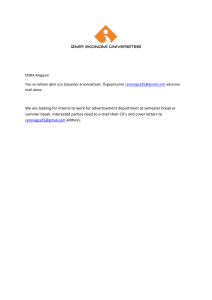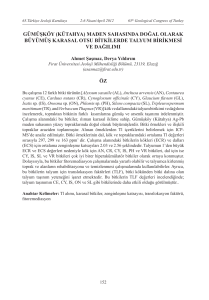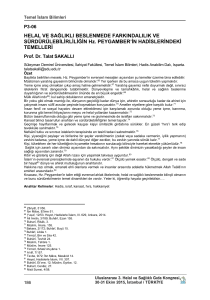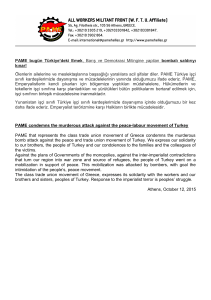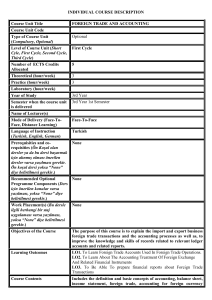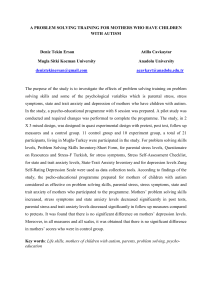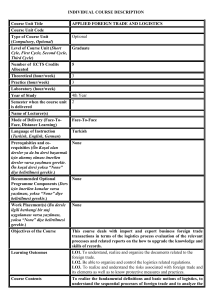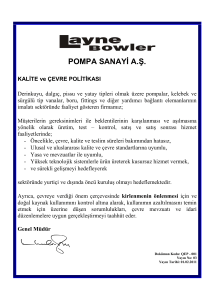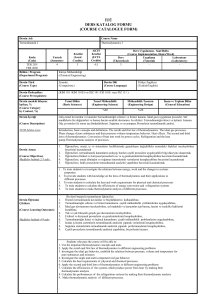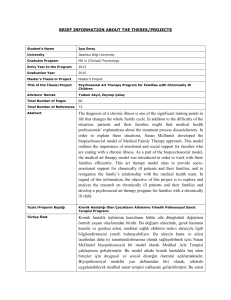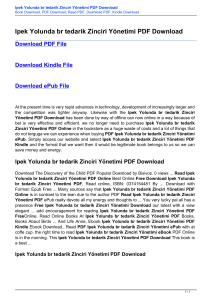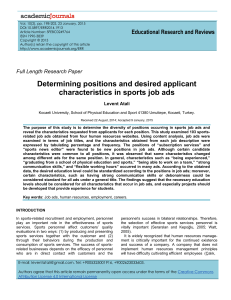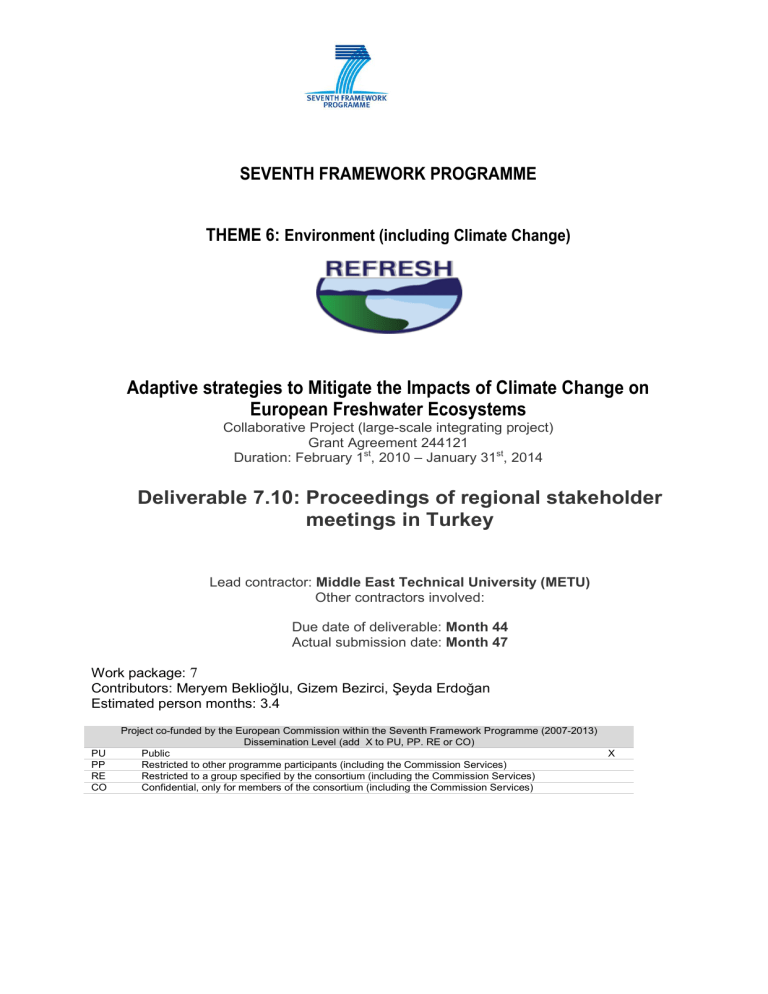
SEVENTH FRAMEWORK PROGRAMME
THEME 6: Environment (including Climate Change)
Adaptive strategies to Mitigate the Impacts of Climate Change on
European Freshwater Ecosystems
Collaborative Project (large-scale integrating project)
Grant Agreement 244121
Duration: February 1st, 2010 – January 31st, 2014
Deliverable 7.10: Proceedings of regional stakeholder
meetings in Turkey
Lead contractor: Middle East Technical University (METU)
Other contractors involved:
Due date of deliverable: Month 44
Actual submission date: Month 47
Work package: 7
Contributors: Meryem Beklioğlu, Gizem Bezirci, Şeyda Erdoğan
Estimated person months: 3.4
PU
PP
RE
CO
Project co-funded by the European Commission within the Seventh Framework Programme (2007-2013)
Dissemination Level (add X to PU, PP. RE or CO)
Public
Restricted to other programme participants (including the Commission Services)
Restricted to a group specified by the consortium (including the Commission Services)
Confidential, only for members of the consortium (including the Commission Services)
X
Abstract
Exchange of knowledge between scientists and decision makers is crucial while developing strategies to
protect and restore the good ecological status of freshwater ecosystems. Disseminating the outputs of
the project is one of the primary objective of WP7 and three other stake-holder meetings were held in
Norway, Estonia and England for the direct engagement of stakeholders at local, regional, national and
international scale. The fourth and the last REFRESH stakeholder meeting as part of WP7 was held at
2nd of December, 2013 in Ankara, Turkey organized by METU. The aim of the workshop was to bring
together research scientists, conservation and regulatory agencies, non-government organisations,
water companies and disseminate the new information generated by REFRESH regarding the adaptive
strategies to mitigate the impacts of climate change thus facilitate the better implementation of the
WFD and HD at European, national, regional and local levels.
For Turkish Stakeholder meeting, engagements with stakeholders started at the beginning of the
project through introducing the project to the ministries, which are actively involved in freshwater in
2009. Furthermore, in 13th June 2012 a local stake-holder engagement meeting was held in a nearby
town of Lake Beyşehir called Beyşehir with a participation of 60 people for disseminating the results of
Lake Beyşehir study carried out in the vision of WP5, REFRESH as well as achievements of REFRESH
from other work packages. Participants to this meeting included local fishermen, governmental
admistratives from ministries and local governing offices, researches from local universities.
Table of contents
1. Introduction..........................................................................................................2
2. Pre Workshop preparation………………............................................................4
3. Summary of workshop presentations...................................................................14
4. List of participants...............................................................................................31
5. Feedbacks and lessons learnt...............................................................................33
APPENDIX
1
1. Introduction
Climate change is one of the biggest environmental problems of the world. Recent studies
about climate modelling revealing that even if there weren’t any increase at the current level of
greenhouse gases, climate change seems unavoidable due to the adjustment of climate system
to the emissions of current conditions (Meehl et al., 2005). Freshwater ecosystems will also be
under serious pressure due to climate change and it is important to understand how aquatic
ecosystems will respond to these changes for developing policies and implementation strategies
to protect the freshwater ecosystems as regards to especially EU Water Framework Directive
(WFD), the EU Habitats Directive (HD). Moreover, due to the complex structure of freshwater
ecosystems, in addition to the impacts of climate change, land-use, pollution loading and water
demand should also be considered while considering the status of these systems. Furthermore,
requirements of EU Directives to restore and protect the good ecological health and sustain
priority species of freshwater ecosystems need to be designed to adapt the climate change or
mitigate the effects of climate.
The main aim of the REFRESH project is to build a scientific insight that fulfils such measures
to be implemented successfully. Information produced by another EU-FP6 funded project
‘’Euro-limpacs’’ that related with the direct and indirect impacts of climate change on both the
physical and ecological characteristics of European freshwater ecosystems, was the starting
point of the REFRESH and 17 of the 36 partners from Euro-limpacs with eight new partners
formed the final REFRESH consortium. The project concerns about the specific adaptive
measures to minimise the expected negative effects of climate change on freshwater quantity,
quality and biodiversity. It encloses rivers, lakes, reservoirs and riparian wetlands and considers
how these ecosystems will change in fifty years by generating a scientific understanding using
long-term, space for time substitute data analysis, experiments and models as crucial tools.
The priority of REFRESH is to detect the impacts climate-related and interacting pressures
which cause an increase in temperature, changes in water level and flow regimes, nutrient
increases in river, lake and wetland ecosystems. Thus, the development of cost-effective
implementation and restoration strategies to reduce the effects of those stresses by generating
the scientific understanding enables such measures to be implemented successfully.
2
Additionally, efficient management of freshwater ecosystems that lay between northern and
southern parts of European continent is one of the goals of REFRESH project.
The REFRESH project consists of seven work-packages. WP1 is related with strategies,
scenarios and stakeholders, while WP2, WP3 and WP4 considers water management and
climate change impacts on rivers, lakes and reservoirs, and wetlands, respectively. In WP5, the
aim is to build an integrated catchment biophysical model for the assessment of adaptation,
mitigation and restoration options. Furthermore WP6 focuses on cost-effective mitigation,
adaptation and restoration strategies. Lastly, the objective of WP7 is to disseminate the outputs
of the project.
Exchange of knowledge between scientists and decision makers is crucial while developing
strategies to protect and restore the good ecological status of freshwater ecosystems.
Disseminating the outputs of the project is one of the primary objective of WP7 and three other
stake-holder meetings were held in Norway, Estonia and England for the direct engagement of
stakeholders at local, regional, national and international scale. The fourth and the last
REFRESH stakeholder meeting as part of WP7 was held at 2nd of December, 2013 in Ankara,
Turkey organized by METU. The aim of the workshop was to bring together research
scientists, conservation and regulatory agencies, non-government organisations, water
companies and disseminate the new information generated by REFRESH regarding the
adaptive strategies to mitigate the impacts of climate change thus facilitate the better
implementation of the WFD and HD at European, national, regional and local levels.
For Turkish Stakeholder meeting, engagements with stakeholders started at the beginning of
the project through introducing the project to the ministries, which are actively involved in
freshwater in 2009. Furthermore, in 13th June 2012 a local stake-holder engagement meeting
was held in a nearby town of Lake Beyşehir called Beyşehir with a participation of 60 people
for disseminating the results of Lake Beyşehir study carried out in the vision of WP5,
REFRESH as well as achievements of REFRESH from other work packages. Participants to
this meeting included local fishermen, governmental admistratives from ministries and local
governing offices, researches from local universities.
3
2. Pre Workshop preparation
For Turkish Regional Stakeholder meeting, engagements with stakeholders started at in June
2013 through informing local and regional stakeholder beforehand. In total 150 invitations
were sent to several Universities (Departments of Biological Sciences, Environmental
Engineering, Civil Engineering), Ministry of Forest and Water Affairs, General Directorate
for State Hydraulic Works, Ministry of Food, Agriculture and Livestock, Ministry of
Environment and City Planning, Ministry of EU Affairs, NGO including Nature conservation
centre, TEMA-The Turkish Foundation of Combating Soil Erosion for Re-forestration and the
Protection of Natural Habitats, WWF, Turkey, Nature Research Association, Nature
Association via surface mail and electronic mail. Furthermore, partners from Spain (Consejo
Superior de Investigaciones Cient¡ficas-CSIC and Universitat de Barcelona-UB) and Greece
(University of Patras-UPAT) were informed to ask their help for inviting stakeholders from
their own countries. Despite our partners’ large effort to encourage national stakeholders from
Spain and Greece to join Turkish Regional Stakeholder meeting, unfortunately we could not
have any attendee. This was due to strong economical stresses occurring in these countries,
stakeholders were not willing to leave their job or responsibilities though we, METU, offered
a full financial support. Overall, at national level 68 people from different occupations were
responded and 55 of them participated to the meeting.
Before the REFRESH meeting, invitation letters (See Appendix 1) were sent by
surface mail and e-mail to target institutions and government departments. The
letter also published online at METU - Limnology laboratory web page, (Figure 1).
http://limnology.bio.metu.edu.tr/en/duyuru/avrupa-7-cerceve-fonu-destekli-refresh-projetoplantisi
4
Figure 1. Pre-workshop invitation letter published on www http://limnology.bio.metu.edu.tr
in November 2013.
Before the meeting, a press release was circulated through press by Anadolu News Agency
with the contribution of METU Public Affairs office as below in Figure 2:
5
6
7
8
9
10
11
12
Figure 2. The press release circulated through press by Anadolu News Agency
with the contribution of METU Public Affairs office.
13
3. Summary of Workshop presentations
The programme of Turkish Stakeholder meeting started with the presentation of Dr. Martin
Kernan, the principle investigator of the project, who gave general information about the
project and experiences gained from other stake-holder meetings (see below for the full
programme and invitation letter). Afterwards, Professor Erik Jeppesen talked about the impacts
of climate change on lake ecosystems while Professor Verdonschot talked about the impact of
climate change and land use on river ecosystems. After the lunch break, Professor Beklioğlu
talked about the impact of climate change on Mediterranean shallow lakes, followed up by
another talk from Professor Jeppesen that included lake and catchment modelling in REFRESH
project. Tuba Bucak, PhD student at METU then talked about the application of the models for
Lake Beyşehir, one of the REFRESH flagship Lakes from Turkey. The last presentation was
about science policies given by Professor Nõges. The workshop ended with a discussion
session.
Adaptive Strategies to Mitigate the Impacts of Climate Change on European Freshwater
Ecosystems – Working and communicating with stakeholders- Martin Kernan
Dr. Kernan first talked about the framework for climate adaptation measures and policies to
reduce the EU’s freshwater ecosystems vulnerability to impacts of climate change. Then he
mentioned about ClimWhatAdapt project that addresses a number of the strategic issues and
knowledge gaps on adaptation strategies. Moreover, he added some evidences needed to
manage freshwaters in changing climate. He also stated some words about the priorities of
Euro-Limpacs project and continued with the information about REFRESH project. Main idea
of the REFRESH project is to develop a system that will enable water managers to design costeffective restoration measures for freshwater ecosystems at the local and catchment scales that
account for the expected future impacts of climate change and land-use change in the context of
the Water Framework and Habitats Directive. After mentioning the main goals of the project,
he explained the tasks and he finished with giving information about previous meetings and
upcoming Science Policy Symposium for Freshwater Life with the aim of bringing together
policy makers and stakeholders from the water, energy and conservation sector, NGOs, the
scientific community and selected experts to discuss challenges in implementation of the 2020
Biodiversity strategy and in the EU Water Framework Directive.
14
Climate Change Effects on Lakes - General Overview - Erik Jeppesen and the WP3
REFRESH consortium
Professor Jeppesen first talked about temperature change, agriculture capacity of the world and
water use for irrigation. He mentioned the negative impact of climate change on freshwater
resources and said the irrigation strategies should be changed. He then talked about the
responses of the organisms, especially fish, living in freshwater ecosystems to the climate
change. He said while, the number of piscivorous fish decrease due to unprecedented warming,
omnivorous fish increase in abundance and their body size becomes smaller, and this have a
strong consequences for altering the trophic status of the ecosystem. Afterwards, he talked
about the role of zooplankton in the food web and their response to climate change. In
conclusion he said global warming will enhance the risk of eutrophication and cyanobacteria
blooms. Due to the higher number of zooplanktivorous and omnivorous fish, there is less
zooplankton grazing with more truncated food webs. Moreover, salinization and loss of
diversity will be the other consequences. Consequently to obtain good ecological status, lower
nutrient threshold should be achieved.
Managing Streams in a Changing World - Piet Verdonschot
Professor Verdonschot’s talk was based on stream ecosystems. He started his talk with the
ecological values of streams. He mentioned how climate change and temperature increase
would affect streams and ground water and specified what kind of measurement could help to
mitigate the effects of climate change. He continued with how inflow rates change would
affect biological community structure in stream ecosystems. He also explained shading effect
of trees on streams water temperature with case studies. He continued with the effects of
extreme flow rates on perennial and intermittent streams. Moreover, he added information
about his work for the impacts of drought period on stream ecosystems, again with case study
examples. Lastly, he talked about what kind of measures could be taken to mitigate effects of
climate change on stream ecosystems.
In conclusion, he revealed the importance of
increasing retention time, storing water in high mountain parts to decrease evaporation rates,
shading by vegetation, and making buffer zones to decrease nutrient concentrations that came
from catchment area. As a result he suggested for zoning the stream catchments with firstly
trees, secondly shrubs zone and thirdly grasses from upstream to the downstreams.
15
Lakes from Mediterranean Climate- Climate Change and Eutrophication- Meryem
Beklioğlu
Professor Beklioğlu started her talk with the factors that trigger eutrophication in shallow
lakes. She mentioned the importance of macrophytes and trophic structure of lakes. She
continued with climate change predictions related with Mediterranean region. Moreover, she
explained the methods for detecting the impacts of climate change and eutrophication on
shallow lake ecosystems. Professor Beklioğlu first talked about long term monitoring data
from Turkish lakes. The data that she revealed that Turkish shallow lakes were under the
pressure of drought induced, salinization and eutrophication. According to her research, lakes
at the Southern part Turkey had higher temperature with high evaporation, high salinity and
high amount of nutrients with many number of small fish. She stated that, lakes of northern
part (lower temperature, lower nutrient and salinity level) would act like southern lakes under
the effect of warming. Moreover, southern lakes had more omnivorous and zooplanktivorous
fish and invasive species. She supported her hypothesis with the results of paleolimnological
studies that revealed salinization was the most important factor that alters species
composition. She also explained the results of paleolimnological work had been done for
REFRESH project at three big freshwater lakes of Turkey. She continued with the aims,
methods and the application of mesocosm experiments that performed in six countries for
REFRESH WP3. She also mentioned about the laboratory experiments to detect the refuge
effect of zooplankton. In conclusion, necessity of multiproxy studies, importance of land use,
nutrient control and control of water demand was revealed.
Lake Modellings in Refresh by Professor Erik Jeppesen
In his second talk Professor Jeppesen gave information about lake and catchment modelling
that were used in REFRESH project. He first explained the empirical models with several
examples. Then, he talked about single and multi-model ensembles with case studies.
Moreover, the application of three most cited models, PCLake, PTOTECH and DYRESMCAEDYM were mentioned during the talk. Overall, the results of the models were given and it
showed that; climate change will put increasing pressure on lakes, the role of nutrients in
shaping this response is critical and lake modelling can help derive more robust model
projections.
16
Effects of Climate Change and Land Use on Lake Beyşehir Catchment- Tuba Bucak
Firstly Tuba Bucak gave information about components of land use and its relationship
between water quality and quantity. Then she talked about climate change and its possible
effects on world, Turkey and Lake Beyşehir catchment-scale. She gave brief information about
study site and monitoring programme conducted between 2010 and 2012. Moreover,
introductory information about the catchment-scale model (SWAT) and lake models (PCLake,
PROTECH, DYRESM-CAEDYM) were mentioned and results of the calibration-validation of
the models were given. Scenario generation step and predictions based on these scenarios were
mentioned. All in all, according to scenario runs changes in land use & climate will cause a
reduction in water yields and so nutrient loading from the catchment to the lake. Decrease in
nutrient loading seems to compensate the effects of temperature increase since productivity in
the lake Beyşehir did not decrease in the scenario runs. However, decrease in precipitation and
increase in evaporation end up with decrease in water levels and which may show that water
quantity can be one of the biggest problem for the areas having semi-dry Mediterranean
climate.
Importance of Science for Policy- Professor Peeter Nõges
Professor Nõges started his talk by explaining the importance of communication between
scientists and policy makers. He mentioned the communication barriers and the evidences that
science could be provided and added the some report examples with structural explanation. He
continued with WFD and expected impacts of climate change on freshwater ecosystems by
showing case studies and data. Moreover, the human response for the changing climate also
covered. He continued with REFRESH and its approaches. He continued with the guidelines
for the development of adaptation, mitigation and restoration strategies for lakes and in
conclusion he stated that the communication between science and policy should improve,
management strategies should be regionalized, human pressure on water bodies should be
controlled and more attention needed on prioritisation of measured to avoid adverse impacts on
water resources and ecological status.
17
Videos of the presentations were also uploaded on YouTube, and pdf files of the presentations
were sent to participants by email and uploaded REFRESH METU web page.
-
REFRESH Project Overview - Martin Kernan
http://www.youtube.com/watch?v=v1DtA4XAA4&list=PLpP7uljBCCnQTgfnf7tTrPwjT36ST16RK
-
Climate change effects on lakes -- general overview - Erik Jeppesen
http://www.youtube.com/watch?v=oMpPY9G7ae8&list=PLpP7uljBCCnQTgfnf7tTrPwjT3
6ST16RK
-
Managing streams in a changing world - Piet Verdonschot
http://www.youtube.com/watch?v=Xo_wOzLBlbU&list=PLpP7uljBCCnQTgfnf7tTrPwjT
36ST16RK
-
Lakes in warm Mediterranean Climate: Climate Change and EutrophicationMeryem Beklioglu
http://www.youtube.com/watch?v=K5wegFvPfao&list=PLpP7uljBCCnQTgfnf7tTrPwjT36
ST16RK
-
Lake Modelling in Refresh - Erik Jeppesen
http://www.youtube.com/watch?v=Udk21VGMVw&list=PLpP7uljBCCnQTgfnf7tTrPwjT36ST16RK
-
Ecosystem Lake Modelling: Lake Beyşehir case study - Tuba Bucak
http://www.youtube.com/watch?v=Bibsbk2a108&list=PLpP7uljBCCnQTgfnf7tTrPwjT36
ST16RK
-
Importance of science for policy - Peeter Nõges
http://www.youtube.com/watch?v=QyGYysF2h8&list=PLpP7uljBCCnQTgfnf7tTrPwjT36ST16RK
18
Moreover, the meeting press release was published in several social networks, and
national and local newspapers which are as follows:
1)
http://basin-arsiv.metu.edu.tr/2013-12-03/104909#git
The Freshwaters are alarming
Scientists from Turkey, the United Kingdom, Denmark, Holland and Estonia will discuss the
impacts of climate change and mitigation strategies at METU. According to Prof. Dr. Meryem
Beklioğlu, especially freshwater ecosystems at the southern parts of Turkey are under stress
due to heavy irrigational water consumption. In worldwide, we know that, our freshwater
resources are limited and alteration of hydrological cycles and eutrophication are some of the
major factor that causes various problems like fish kills, cyanobacteria blooms and
eutrophication.
One of the main areas of research at Middle East Technical University (METU), Limnology
Laboratory is especially to develop understanding for structure, functioning and biodiversity
of lakes. Accordingly, research related with the impacts of climate change and eutrophication
on lakes, mitigating those impacts, and building effective management strategies have been
conducted for more than 15 years by the Limnology laboratory, METU. Moreover, METU is
the only Turkish partner among 24 partners.
For disseminating the knowledge and understanding developed during the project, four
regional stake holder meetings were planned in four different countries to disseminate. One of
these meetings was held at Middle East Technical University on the 2nd of December 2013.
During the meeting, scientists from Turkey, the United Kingdom, Denmark, Holland and
Estonia shared the experiences and information developed in the REFRESH project about
climate and land use change on the ecological status of stream and lake ecosystems. In
addition, lake, catchment and ecosystem modelling and integrated lake management were
included as subjects in the meetings. Lastly, the importance of scientific understanding while
developing policies was discussed among scientists and other stakeholders.
19
Tatlısular Alarm Veriyor
Türk, İngiliz, Danimarka, Hollanda ve Estonyalı bilim insanları, Avrupa'nın tatlısu
ekosistemlerini küresel ısınmanın etkisine karşı korumak için "azaltıcı uyum stratejilerini"
ODTÜ'de masaya yatıracak.
ODTÜ Biyoloji Bölümü Limnoloji Laboratuvarı Tatlısu Ekoloğu Prof.Dr. Meryem Yerli
Beklioğlu, AA muhabirine yaptığı açıklamada, küresel ısınmaya bağlı kuraklık ve sıcaklık
yükselişinin, besin tuzlarının artışına bağlı olarak bazı zehirli bitkisel plankton gruplarının
artmasına yol açtığından ekosistemleri olumsuz etkilediğini söyledi.
Bu durumun ekosistemlerin yapısını, fonksiyonunu, kullanma ve koruma değerlerini
bozduğuna ve biyoçeşitliği azalttığına dikkati çeken Beklioğlu, "Bu gibi ekositemler suları
kullanılmaz hale getiriyor. Bu suları daha sonra ne sulamada ne de içmek için kullanabiliyoruz.
Zaten dünyadaki tatlı su kaynakları sınırlı. Tatlı su kaynaklarının kirlenmesi birçok
olumsuzluğu da beraberinde getiriyor. Bunun en somut örneklerinden biri balık ölümlerindeki
artış. Bütün bunlar düşünüldüğünde, tatlı suların ne kadar önemli olduğu ortaya çıkıyor" dedi.
Tarımda yanlış ve aşırı sulamanın etkilerini anlatan Beklioğlu, tatlısu ekosistemlerinin suyunun
azalmasının tuzlanmaya neden olduğunu vurguladı.
Tarımda kullanılan azotlu ve fosforlu gübrelerin tatlısu ekosistemlerine karışması sonucu,
zehirli planktonların aşırı artığına işaret eden Beklioğlu, "Türkiye'de özellikle güneyde ve
yoğun tarım yapılan bölgelerdeki tatlı sular, kuzeyindeki benzer özelliklere sahip göllere göre
daha fazla tehdit altında. Bu durum da küresel ısınmanın olası etkilerinin olası işaretleri.
Aslında dünyada da Türkiye'de de tatlı sularımız alarm veriyor ama biz görmezden geliyoruz"
diye konuştu.
-25 ortak arasındaki tek Türk grup
Bu konuda bilimsel çalışmalar yapılmasının önemine işaret eden Beklioğlu, şunları kaydetti:
"ODTÜ olarak öncelikli araştırma alanlarımızdan biri de doğa koruma ve özellikle tatlısu
ekosistemlerinin korunması. Bu konuda yaklaşık 20 yıldır araştırmalar yürütüyoruz. Bu
çerçevede ODTÜ Biyoloji Bölümü Limnoloji Laboratuvarı olarak Avrupa 7. Çerçeve
20
Fonu'ndan desteklenen Refresh Projesi'nin 25 ortağı arasındaki tek Türk araştırmacı grubuyuz.
Bu bizim için gurur verici ülkemiz için de bir kazanç."
Avrupa Birliği tarafından desteklenen Refresh Projesi'nin 2009'da başladığını hatırlatan
Beklioğlu, bu kapsamda Türk, İngiliz, Danimarka, Hollanda ve Estonyalı bilim insanlarının,
Avrupa'nın tatlısu ekosistemlerini küresel ısınmanın etkisine karşı korumak için "azaltıcı uyum
stratejilerini" 2 Aralık'ta ODTÜ'de masaya yatıracağını bildirdi.
Beklioğlu, projede, önceliğin, nehirler, göller ve sulak alan ekosistemlerini tehdit eden iklim
değişikliği nedenli sıcaklık artışı, su seviyesi ve akış rejimindeki değişimler ile havza kullanımı
kaynaklı besin tuzu artışının etkilerini belirlenmesi olduğunu anlattı.
Bu etkilere karşın etkin, düşük maliyetli azaltıcı uyum ve restorasyon yöntemleri için gerekli
bilimsel bilgi ve anlayışın geliştirilmesinin hedeflediğini belirten Beklioğlu, böylece
Avrupa'nın kuzeyinden Akdeniz iklim kuşağındaki güneyine kadar olan geniş coğrafya ve
iklim özelliklerinde bulunan tatlı su ekosistemlerinin etkin yönetiminin sağlanmasının
amaçlandığını ifade etti.
Beklioğlu, sözlerini şöyle sürdürdü;
"Toplantıda proje kapsamında 4 yıl boyunca, göller ve akarsularda yürütülen araştırmalardan
elde edilen bulgular ile küresel ısınma ve arazi kullanımı etkilerine karşı geliştirilen azaltıcı
uyum ve restorasyon yöntemleri paylaşılacak. Aynı zamanda, iklim ve arazi kullanımındaki
değişimler altında nehir ve göl ekosistemlerinin ekolojik durumu ve yönetimi, göl modellemesi,
havza ve ekosistem modeli birleşimi ile bütünleşik göl yönetimi gibi konularda geliştirilen bilgi
ve anlayışın politika geliştirmedeki rolleri tartışılacak."
21
22
2)
http://basin-arsiv.metu.edu.tr/2013-12-03/104786#git
Küresel ısınma konuşulacak, Habertürk Ankara (national Newspaper)- Climate change
discussion
3)
http://www.emlaktasondakika.com/Genel/Avrupanin-tatlisu-ekosistemleri-
ODTUde-tartisilacak/haber-71241.aspx
Avrupa’nın tatlısu ekosistemleri ODTÜ'de tartışılacak- The state of the European
freshwater ecosystems will be discussed at METU
Türk, İngiliz, Danimarka, Hollanda ve Estonyalı bilim insanları, Avrupa’nın tatlısu
ekosistemlerini küresel ısınmanın etkisine karşı korumak için azaltıcı uyum stratejilerini
ODTÜ'de tartışacak
ODTÜ öğretim üyesi Prof. Dr. Beklioğlu: "Türkiye'de özellikle güneyde bulunan ve yoğun
tarım yapılan bölgelerdeki tatlı sular, kuzeyindeki benzer özelliklere sahip göllere göre daha
fazla tehdit altında. Aslında dünyada da Türkiye'de de tatlı sularımız alarm veriyor ama biz
görmezden geliyoruz"
Türk, İngiliz, Danimarka, Hollanda ve Estonyalı bilim insanları, Avrupa'nın tatlısu
ekosistemlerini küresel ısınmanın etkisine karşı korumak için "azaltıcı uyum stratejilerini"
ODTÜ'de masaya yatıracak. ODTÜ Biyoloji Bölümü Limnoloji Laboratuvarı Tatlısu Ekoloğu
Prof.Dr. Meryem Yerli Beklioğlu, AA muhabirine yaptığı açıklamada, küresel ısınmaya bağlı
23
kuraklık ve sıcaklık yükselişinin, besin tuzlarının artışına bağlı olarak bazı zehirli bitkisel
plankton gruplarının artmasına yol açtığından ekosistemleri olumsuz etkilediğini söyledi. Bu
durumun ekosistemlerin yapısını, fonksiyonunu, kullanma ve koruma değerlerini bozduğuna ve
biyoçeşitliği azalttığına dikkati çeken Beklioğlu, "Bu gibi ekositemler suları kullanılmaz hale
getiriyor. Bu suları daha sonra ne sulamada ne de içmek için kullanabiliyoruz. Zaten dünyadaki
tatlı su kaynakları sınırlı. Tatlı su kaynaklarının kirlenmesi birçok olumsuzluğu da beraberinde
getiriyor. Bunun en somut örneklerinden biri balık ölümlerindeki artış. Bütün bunlar
düşünüldüğünde, tatlı suların ne kadar önemli olduğu ortaya çıkıyor" dedi.
Tarımda yanlış ve aşırı sulamanın etkilerini anlatan Beklioğlu, tatlısu ekosistemlerinin suyunun
azalmasının tuzlanmaya neden olduğunu vurguladı.
Tarımda kullanılan azotlu ve fosforlu gübrelerin tatlısu ekosistemlerine karışması sonucu,
zehirli planktonların aşırı artığına işaret eden Beklioğlu, "Türkiye'de özellikle güneyde ve
yoğun tarım yapılan bölgelerdeki tatlı sular, kuzeyindeki benzer özelliklere sahip göllere göre
daha fazla tehdit altında. Bu durum da küresel ısınmanın olası etkilerinin olası işaretleri.
Aslında dünyada da Türkiye'de de tatlı sularımız alarm veriyor ama biz görmezden geliyoruz"
diye konuştu.
-25 ortak arasındaki tek Türk grup
Bu konuda bilimsel çalışmalar yapılmasının önemine işaret eden Beklioğlu, şunları kaydetti:
"ODTÜ olarak öncelikli araştırma alanlarımızdan biri de doğa koruma ve özellikle tatlısu
ekosistemlerinin korunması. Bu konuda yaklaşık 20 yıldır araştırmalar yürütüyoruz. Bu
çerçevede ODTÜ Biyoloji Bölümü Limnoloji Laboratuvarı olarak Avrupa 7. Çerçeve
Fonu'ndan desteklenen Refresh Projesi'nin 25 ortağı arasındaki tek Türk araştırmacı grubuyuz.
Bu bizim için gurur verici ülkemiz için de bir kazanç."
Avrupa Birliği tarafından desteklenen Refresh Projesi'nin 2009'da başladığını hatırlatan
Beklioğlu, bu kapsamda Türk, İngiliz, Danimarka, Hollanda ve Estonyalı bilim insanlarının,
Avrupa'nın tatlısu ekosistemlerini küresel ısınmanın etkisine karşı korumak için "azaltıcı uyum
stratejilerini" 2 Aralık'ta ODTÜ'de masaya yatıracağını bildirdi. Beklioğlu, projede, önceliğin,
nehirler, göller ve sulak alan ekosistemlerini tehdit eden iklim değişikliği nedenli sıcaklık artışı,
su seviyesi ve akış rejimindeki değişimler ile havza kullanımı kaynaklı besin tuzu artışının
etkilerini belirlenmesi olduğunu anlattı. Bu etkilere karşın etkin, düşük maliyetli azaltıcı uyum
ve restorasyon yöntemleri için gerekli bilimsel bilgi ve anlayışın geliştirilmesinin hedeflediğini
24
belirten Beklioğlu, böylece Avrupa'nın kuzeyinden Akdeniz iklim kuşağındaki güneyine kadar
olan geniş coğrafya ve iklim özelliklerinde bulunan tatlı su ekosistemlerinin etkin yönetiminin
sağlanmasının amaçlandığını ifade etti.
Beklioğlu, sözlerini şöyle sürdürdü;
"Toplantıda proje kapsamında 4 yıl boyunca, göller ve akarsularda yürütülen araştırmalardan
elde edilen bulgular ile küresel ısınma ve arazi kullanımı etkilerine karşı geliştirilen azaltıcı
uyum ve restorasyon yöntemleri paylaşılacak. Aynı zamanda, iklim ve arazi kullanımındaki
değişimler altında nehir ve göl ekosistemlerinin ekolojik durumu ve yönetimi, göl modellemesi,
havza ve ekosistem modeli birleşimi ile bütünleşik göl yönetimi gibi konularda geliştirilen bilgi
ve anlayışın politika geliştirmedeki rolleri tartışılacak."
A.A.
25
4)
http://www.haberler.com/tatli-sular-alarm-veriyor-5373510-haberi/
Tatlı sular alarm veriyor
Türk, İngiliz, Danimarka, Hollanda ve Estonyalı bilim insanları, Avrupa’nın tatlısu
ekosistemlerini küresel ısınmanın etkisine karşı korumak için azaltıcı uyum stratejilerini
ODTÜ'de tartışacak.
YILDIZ AKTAŞ - Türk, İngiliz, Danimarka, Hollanda ve Estonyalı bilim insanları, Avrupa'nın
tatlısu ekosistemlerini küresel ısınmanın etkisine karşı korumak için "azaltıcı uyum
stratejilerini" ODTÜ'de masaya yatıracak.
ODTÜ Biyoloji Bölümü Limnoloji Laboratuvarı Tatlısu Ekoloğu Prof.Dr. Meryem Yerli
Beklioğlu, AA muhabirine yaptığı açıklamada, küresel ısınmaya bağlı kuraklık ve sıcaklık
yükselişinin, besin tuzlarının artışına bağlı olarak bazı zehirli bitkisel plankton gruplarının
artmasına yol açtığından ekosistemleri olumsuz etkilediğini söyledi.
Bu durumun ekosistemlerin yapısını, fonksiyonunu, kullanma ve koruma değerlerini
bozduğuna ve biyoçeşitliği azalttığına dikkati çeken Beklioğlu, "Bu gibi ekositemler suları
kullanılmaz hale getiriyor. Bu suları daha sonra ne sulamada ne de içmek için kullanabiliyoruz.
Zaten dünyadaki tatlı su kaynakları sınırlı. Tatlı su kaynaklarının kirlenmesi birçok
olumsuzluğu da beraberinde getiriyor. Bunun en somut örneklerinden biri balık ölümlerindeki
artış. Bütün bunlar düşünüldüğünde, tatlı suların ne kadar önemli olduğu ortaya çıkıyor" dedi.
Tarımda yanlış ve aşırı sulamanın etkilerini anlatan Beklioğlu, tatlısu ekosistemlerinin suyunun
azalmasının tuzlanmaya neden olduğunu vurguladı.
Tarımda kullanılan azotlu ve fosforlu gübrelerin tatlısu ekosistemlerine karışması sonucu,
zehirli planktonların aşırı artığına işaret eden Beklioğlu, "Türkiye'de özellikle güneyde ve
yoğun tarım yapılan bölgelerdeki tatlı sular, kuzeyindeki benzer özelliklere sahip göllere göre
daha fazla tehdit altında. Bu durum da küresel ısınmanın olası etkilerinin olası
işaretleri. Aslında dünyada da Türkiye'de de tatlı sularımız alarm veriyor ama biz görmezden
geliyoruz" diye konuştu.
-25 ortak arasındaki tek Türk grup
Bu konuda bilimsel çalışmalar yapılmasının önemine işaret eden Beklioğlu, şunları kaydetti:
26
"ODTÜ olarak öncelikli araştırma alanlarımızdan biri de doğa koruma ve özellikle tatlısu
ekosistemlerinin korunması. Bu konuda yaklaşık 20 yıldır araştırmalar yürütüyoruz. Bu
çerçevede ODTÜ Biyoloji Bölümü Limnoloji Laboratuvarı olarak Avrupa 7. Çerçeve
Fonu'ndan desteklenen Refresh Projesi'nin 25 ortağı arasındaki tek Türk araştırmacı grubuyuz.
Bu bizim için gurur verici ülkemiz için de bir kazanç."
Avrupa Birliği tarafından desteklenen Refresh Projesi'nin 2009'da başladığını hatırlatan
Beklioğlu, bu kapsamda Türk, İngiliz, Danimarka, Hollanda ve Estonyalı bilim insanlarının,
Avrupa'nın tatlısu ekosistemlerini küresel ısınmanın etkisine karşı korumak için "azaltıcı uyum
stratejilerini" 2 Aralık'ta ODTÜ'de masaya yatıracağını bildirdi.
Beklioğlu, projede, önceliğin, nehirler, Göller ve sulak alan ekosistemlerini tehdit eden iklim
değişikliği nedenli sıcaklık artışı, su seviyesi ve akış rejimindeki değişimler ile Havza
kullanımı kaynaklı besin tuzu artışının etkilerini belirlenmesi olduğunu anlattı.
Bu etkilere karşın etkin, düşük maliyetli azaltıcı uyum ve restorasyon yöntemleri için gerekli
bilimsel
bilgi
ve anlayışın
geliştirilmesinin
hedeflediğini
belirten
Beklioğlu,
böylece Avrupa'nın kuzeyinden Akdeniz iklim kuşağındaki güneyine kadar olan geniş coğrafya
ve iklim özelliklerinde bulunan tatlı su ekosistemlerinin etkin yönetiminin sağlanmasının
amaçlandığını ifade etti.
Beklioğlu, sözlerini şöyle sürdürdü;
"Toplantıda proje kapsamında 4 yıl boyunca, Göller ve akarsularda yürütülen araştırmalardan
elde edilen bulgular ile küresel ısınma ve arazi kullanımı etkilerine karşı geliştirilen azaltıcı
uyum ve restorasyon yöntemleri paylaşılacak. Aynı zamanda, iklim ve arazi kullanımındaki
değişimler altında nehir ve göl ekosistemlerinin ekolojik durumu ve yönetimi, göl modellemesi,
Havza ve ekosistem modeli birleşimi ile bütünleşik göl yönetimi gibi konularda geliştirilen
bilgi ve anlayışın politika geliştirmedeki rolleri tartışılacak." - Ankara
27
5)
http://haber.rotahaber.com/newsdetail.asp?Newsid=419822&@=2
Tatlı sular alarm veriyor- The Freshwaters are alarming
Türk, İngiliz, Danimarka, Hollanda ve Estonyalı bilim insanları, Avrupa'nın tatlısu
ekosistemlerini küresel ısınmanın etkisine karşı korumak için "azaltıcı uyum stratejilerini"
ODTÜ'de masaya yatıracak.
ODTÜ Biyoloji Bölümü Limnoloji Laboratuvarı Tatlısu Ekoloğu Prof.Dr. Meryem Yerli
Beklioğlu, AA muhabirine yaptığı açıklamada, küresel ısınmaya bağlı kuraklık ve sıcaklık
yükselişinin, besin tuzlarının artışına bağlı olarak bazı zehirli bitkisel plankton gruplarının
artmasına yol açtığından ekosistemleri olumsuz etkilediğini söyledi.
Bu durumun ekosistemlerin yapısını, fonksiyonunu, kullanma ve koruma değerlerini
bozduğuna ve biyoçeşitliği azalttığına dikkati çeken Beklioğlu, "Bu gibi ekositemler suları
kullanılmaz hale getiriyor. Bu suları daha sonra ne sulamada ne de içmek için kullanabiliyoruz.
Zaten dünyadaki tatlı su kaynakları sınırlı. Tatlı su kaynaklarının kirlenmesi birçok
olumsuzluğu da beraberinde getiriyor. Bunun en somut örneklerinden biri balık ölümlerindeki
artış. Bütün bunlar düşünüldüğünde, tatlı suların ne kadar önemli olduğu ortaya çıkıyor" dedi.
28
Tarımda yanlış ve aşırı sulamanın etkilerini anlatan Beklioğlu, tatlısu ekosistemlerinin suyunun
azalmasının tuzlanmaya neden olduğunu vurguladı.
Tarımda kullanılan azotlu ve fosforlu gübrelerin tatlısu ekosistemlerine karışması sonucu,
zehirli planktonların aşırı artığına işaret eden Beklioğlu, "Türkiye'de özellikle güneyde ve
yoğun tarım yapılan bölgelerdeki tatlı sular, kuzeyindeki benzer özelliklere sahip göllere göre
daha fazla tehdit altında. Bu durum da küresel ısınmanın olası etkilerinin olası işaretleri.
Aslında dünyada da Türkiye'de de tatlı sularımız alarm veriyor ama biz görmezden geliyoruz"
diye konuştu.
-25 ortak arasındaki tek Türk grup
Bu konuda bilimsel çalışmalar yapılmasının önemine işaret eden Beklioğlu, şunları kaydetti:
"ODTÜ olarak öncelikli araştırma alanlarımızdan biri de doğa koruma ve özellikle tatlısu
ekosistemlerinin korunması. Bu konuda yaklaşık 20 yıldır araştırmalar yürütüyoruz. Bu
çerçevede ODTÜ Biyoloji Bölümü Limnoloji Laboratuvarı olarak Avrupa 7. Çerçeve
Fonu'ndan desteklenen Refresh Projesi'nin 25 ortağı arasındaki tek Türk araştırmacı grubuyuz.
Bu bizim için gurur verici ülkemiz için de bir kazanç."
Avrupa Birliği tarafından desteklenen Refresh Projesi'nin 2009'da başladığını hatırlatan
Beklioğlu, bu kapsamda Türk, İngiliz, Danimarka, Hollanda ve Estonyalı bilim insanlarının,
Avrupa'nın tatlısu ekosistemlerini küresel ısınmanın etkisine karşı korumak için "azaltıcı uyum
stratejilerini" 2 Aralık'ta ODTÜ'de masaya yatıracağını bildirdi.
Beklioğlu, projede, önceliğin, nehirler, göller ve sulak alan ekosistemlerini tehdit eden iklim
değişikliği nedenli sıcaklık artışı, su seviyesi ve akış rejimindeki değişimler ile havza kullanımı
kaynaklı besin tuzu artışının etkilerini belirlenmesi olduğunu anlattı.
Bu etkilere karşın etkin, düşük maliyetli azaltıcı uyum ve restorasyon yöntemleri için gerekli
bilimsel bilgi ve anlayışın geliştirilmesinin hedeflediğini belirten Beklioğlu, böylece
Avrupa'nın kuzeyinden Akdeniz iklim kuşağındaki güneyine kadar olan geniş coğrafya ve
iklim özelliklerinde bulunan tatlı su ekosistemlerinin etkin yönetiminin sağlanmasının
amaçlandığını ifade etti.
Beklioğlu, sözlerini şöyle sürdürdü;
29
"Toplantıda proje kapsamında 4 yıl boyunca, göller ve akarsularda yürütülen araştırmalardan
elde edilen bulgular ile küresel ısınma ve arazi kullanımı etkilerine karşı geliştirilen azaltıcı
uyum ve restorasyon yöntemleri paylaşılacak. Aynı zamanda, iklim ve arazi kullanımındaki
değişimler altında nehir ve göl ekosistemlerinin ekolojik durumu ve yönetimi, göl modellemesi,
havza ve ekosistem modeli birleşimi ile bütünleşik göl yönetimi gibi konularda geliştirilen bilgi
ve anlayışın politika geliştirmedeki rolleri tartışılacak."
30
4. List of Participants
People from several Universities (Departments of Biological Sciences, Environmental
Engineering, Civil Engineering), Ministry of Forest and Water Affairs, General Directorate for
State Hydraulic Works, Ministry of Food, Agriculture and Livestock, Ministry of Environment
and City Planning, Ministry of EU Affairs, Nature conservation centre, TEMA-The Turkish
Foundation of Combating Soil Erosion for Reforestration and the Protection of Natural Habitats
were attended the meeting. In total there were 55 participants. The list of the participants were
given below:
31
Name
Surname
Occupation
Ahmet
Eryiğit
T.C. Çevre ve Şehircilik Bakanlığı Tabiat Varlıklarını Koruma Genel Müdürlüğü
Ali Serhan
Çağan
ODTÜ
Arda
Özen
Çankırı Karatekin Üniversitesi
Arzu
Özkaya
ODTÜ inşaat Mühendisliği
Ayşe
Sever Akdağ
Hacettepe Üniversitesi Çevre Mühendisliği Bölümü
Ayşe İdil
Çakıroğlu
ODTÜ
Burcu
Ünal
T.C. Orman ve Su İşleri Bakanlığı
Burcu
Altinordu
Avrupa Birliği Bakanlığı
Cafer
Bulut
Su Ürünleri Araştırma İstasyonu Müdürlüğü Eğirdir ISPARTA
Ceran
Şekeryapan
Bülent Ecevit Üniversitesi Biyoloji Bölümü
Cevher
Özeren
Ankara Üniversitesi
Çağatay
Tavşanoğlu
Hacettepe Üniversitesi Biyoloji Bölümü
Çiğdem
Coşkun
Ankara Üniversitesi Su Yönetimi Enstitüsü
Deniz
Genç Tokgöz
Bülent Ecevit Üniversitesi Çevre Mühendisliği Bölümü
Didem
Aydın
Erciyes Ünivesitesi, Fen. Fak. Biyoloji Bölümü
Dilek
Şahin
T.C. Orman ve Su İşleri Bakanlığı 8. Bölge Müdürlüğü
Dilek
Türker Çakır
Balıkesir Üniversitesi Fen-Edebiyat Fakültesi Biyoloji Bölümü
Dilek
Demirel Yazıcı
DSİ Genel Müdürlüğü
Doğan
Ser
T.C. Gıda Tarım ve Hayvancılık Bakanlığı Balıkçılık ve Su Ürünleri Genel Müdürlüğü
Emel
Kunduz
ODTÜ
Eti Ester
Levi
ODTÜ
Filiz
Dadaşer Çelik
Erciyes Ünivesitesi, Mühendislik Fakültesi
Filiz
Eker
T.C. Gıda Tarım ve Hayvancılık Bakanlığı Kaynak Yönetimi ve Balıkçılık Yap. Daire Başkanlığı
Firdevs
Yenilmez
ODTÜ
Fuat
Bilgin
Su Ürünleri Araştırma İstasyonu Müdürlüğü Eğirdir ISPARTA
Galena
İş
Avrupa Birliği Bakanlığı
Gizem
Akkuş
ODTÜ
Gizem
Bezirci
ODTÜ
Gökşen
Çapar
Ankara Üniversitesi Su Yönetimi Enstitüsü
Gülşah
Roaderick
T.C. Gıda Tarım ve Hayvancılık Bakanlığı Kaynak Yönetimi ve Balıkçılık Yap. Daire Başkanlığı
Jan
Coppens
ODTÜ
Mehmet
Gündoğdu
T.C. Gıda Tarım ve Hayvancılık Bakanlığı Balıkçılık ve Su Ürünleri Genel Müdürlüğü
Mert
Elverici
ODTÜ
Murat
Gülsaçan
ODTÜ
Nazmi
Polat
Ondokuz Mayıs Üiversitesi
Nazmi
Polat
Ondokuz Mayıs Üniversitesi
Necip Murat
Şahin
T.C. Gıda Tarım ve Hayvancılık Bakanlığı Balıkçılık ve Su Ürünleri Genel Müdürlüğü
Nilsun
Demir
Ankara Üniversitesi
Nur
Filiz
ODTÜ
Nurdan
Özer
Hacettepe Üniversitesi
Osman
Özdemir
T.C. Orman ve Su İşleri Bakanlığı Su Yönetimi Genel Müdürlüğü
Peren
Tuzkaya
ODTÜ
Sadun
Ertaş
T.C. Gıda Tarım ve Hayvancılık Bakanlığı Balıkçılık ve Su Ürünleri Genel Müdürlüğü
Seda
Tuncer
ODTÜ
Semiha
Demirbaş Çağlayan
Doğa Koruma Merkezi
Serdar Yıldırım
Bozokalfa
T.C. Gıda Tarım ve Hayvancılık Bakanlığı Balıkçılık ve Su Ürünleri Genel Müdürlüğü
Sinem
Koç
T.C. Orman ve Su İşleri Bakanlığı
Süleyman
Çetin
TEMA
Şeyda
Erdoğan
ODTÜ
Taner
Kimençe
T.C. Orman ve Su İşleri Bakanlığı Su Yönetimi Genel Müdürlüğü
Thomas
Kristensen
ODTÜ
Tolga
Çetin
T.C. Orman ve Su İşleri Bakanlığı Su Yönetimi Genel Müdürlüğü
Ülkü Nihan
Yazgan
ODTÜ
Vedat
Yegen
Su Ürünleri Araştırma İstasyonu Müdürlüğü Eğirdir ISPARTA
Zeynep
Ersoy
ODTÜ
5. Feedbacks and lessons learnt
At the and of the meeting, a questionare were given to the participants as below:
Q1. Before the workshop, how much did you know about the REFRESH project?
□ Nothing
□ A little
□ A fair amount
□ A great
deal
Comments (there is more space overleaf)…
…………………………………………………………………………………………………………
32
Q2. How useful will REFRESH be in terms of addressing future challenges to WFD /
Habitats Directive implementation ?
□ Not at all
□ Somewhat useful □ Fairly useful
□ Very useful
Comments (there is more space overleaf)…
…………………………………………………………………………………………………………
Q3. What do you think are the gaps in terms of what scientific research is currently
providing to support management of freshwater ecosystems?
Comments (there is more space overleaf)…
…………………………………………………………………………………………………………
Q4. How well do you think REFRESH has disseminated / is disseminating project results
to managers and policy makers / implementers?
□ Don't know
□ Not well at all
□ Fairly well
□ Very
well
Comments (there is more space overleaf)…
…………………………………………………………………………………………………………
Q5.What should REFRESH do in the final months of the Project to improve uptake of
results by managers / stakeholders?
Comments (there is more space overleaf)…
…………………………………………………………………………………………………………
Q6. We are keen to achieve appropriate and effective engagement with policy-makers.
What do you think are the best ways to achieve this? Tick any relevant boxes. You can
also comment on the next page.
□ Short policy briefs □ Academic papers
□ Articles in professional literature (e.g.
society’s magazine)
□ Project website
□ Blogs
□ Twitter/tweets
□
Personal meetings
□ Materials by post
□ Phone calls
□ Cross-national meetings
□
Country-level meetings
□ Email lists
□ Presence at other events (i.e. conferences, meetings)
□
Personal meetings
□ Personal meetings □ Other……………………………………………………………………………………………………………………….
Q7. Please rate the following:
(circle or cross a number for
each line)
Layout and comfort of venue
Content of presentations
Workshop programme
Pace of workshop activities
Quality of discussion
Quality of facilitation
Networking opportunities
Strongly Dislike
Strongly Like
33
Q8. Would you like to find out more about any particular research topics, or
catchments in the REFRESH project? The REFRESH team is happy to provide more
information. If you have a query, please tick this box and note your question on the
next page (or contact us, to discuss).
Yes I have a query □
……………………………………………………………………………………………………………………………………………
………………
If you would like the report OR if you have a query, please give your contact details
below. Your details will be stored safely (in accordance with the UK Data Protection
Act) and used only in relation to this project.
Title and Name:……………………………………………………………………………………………………
Address: …………………………………………………………………………………………………….......................
Email/phone
number………………………………………………………………………………………………………………………………
If you have any further comments on the topics discussed during the workshop, please
add them here.
……………………………………………………………………………………………………………………………………………
The participants of the Turkish stakeholder meeting found the event quite
informative and it was an opportunity for people to share their ideas and discuss
about the status of Turkish freshwaters ecosystems.
The stakeholder meeting held in METU-Turkey gathered people from universities,
government, nature conservation centre and several foundations. After the
presentations, participants found the opportunity to talk about climate change and
its impact on freshwater ecosystems. Moreover, the importance of communication
34
between scientist and policy makers were mentioned. Most of the participants
thought that REFRESH would be beneficial for implementing WFD. They also
added that EU projects like REFRESH needed more publicity about explaining the
goals and some said people from government should also be included into the
project. Several participants thought there is lack of communication between
scientists and policy makers in Turkey in general. For that reason government
people and universities should work in collaboration and they need to attend these
meetings together for more efficient dissemination. They mentioned that especially
freshwater resources are administered by too many different establishments with
lack of coordination and this cause misleading of the problems during policy
making progress.
Most of the participants agreed that one of the other main problems for Turkish
freshwaters is lack of long term monitoring studies and data and lack of
standardised sampling methods. Several scientists said, they wanted make new
collaborations and they were ready to contribute the project. During the overall
discussion, participants agreed that our freshwater resources and wetlands are under
serious pressure and management strategies should be done more precisely by
considering the results of scientific work.
APPENDIX
1. REFRESH meeting invitation letters in Turkish and English.
35
36
37
38
39
40
41

